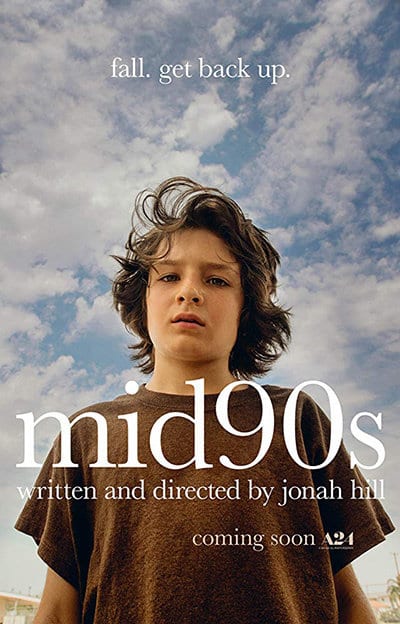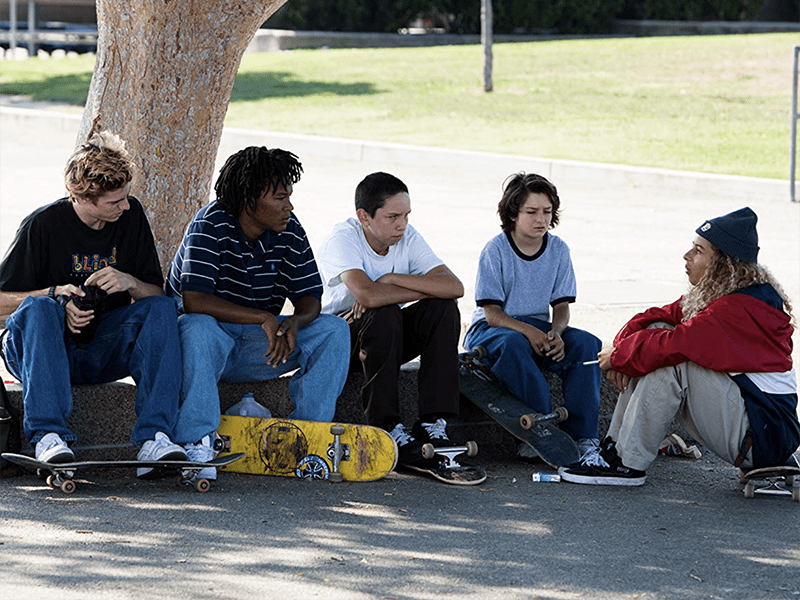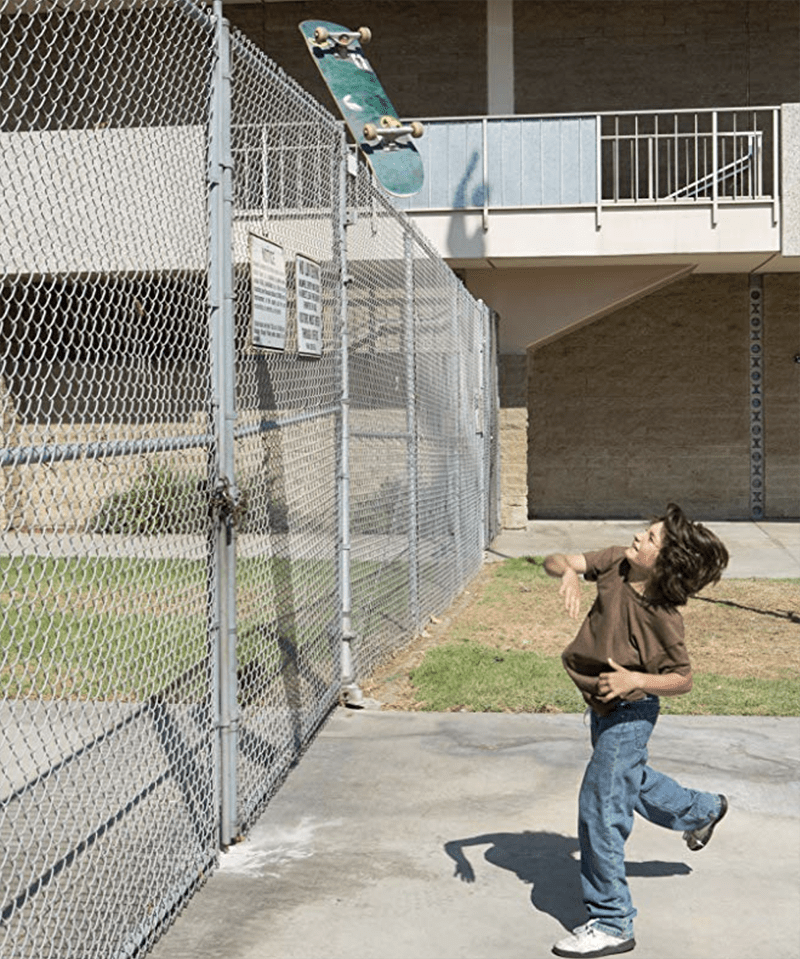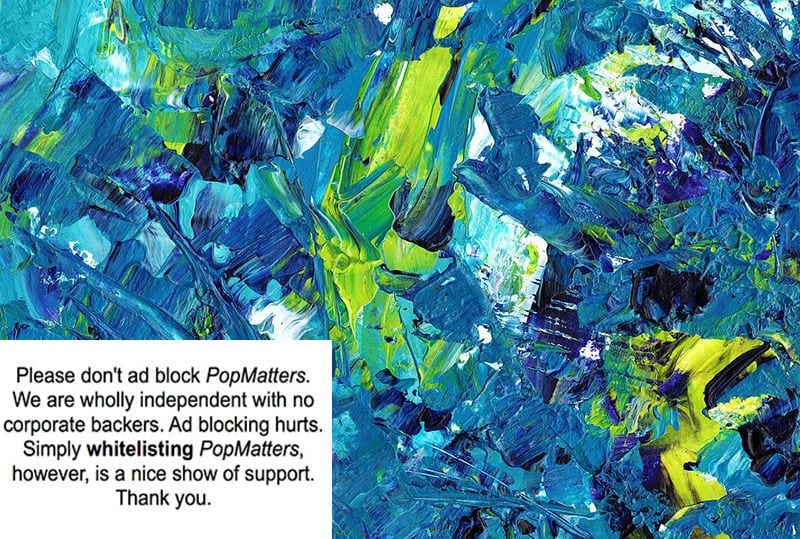
If you’ve had your fill of ’80s nostalgia bombs like Matt and Ross Duffer’s Stranger Things and Andy Muschietti’s It, take a brave step into the ’90s with Jonah Hill’s directorial debut, Mid90s. Instead of teenage boys rampaging through neighborhoods on sticker-laden bikes to the sound of synth-pop, watch teenage boys rampage on skateboards propelled by hip-hop and angst.
What distinguishes Mid90s from these ’80s homages is that Hill isn’t interested in (re)creating a time period through fashion or flash. He’s more interested in dissecting the cultural shift that was occurring in the mid-’90s and its impact on one small group of kids. More specifically, Mid90s is an honest look at how the power of affiliation shapes the male psyche, for both good and ill. Though undisciplined at times, Hill proves he’s a promising filmmaker with a keen eye for human nature.
Somewhere in the ’90s in America, a seismic shift occurred in popular culture that rebuked traditional Middle Class values. Self-improvement through critical thinking, education, and hard work suddenly became corny; artifacts of an American Dream afforded to only a privileged few. The tech bubble was looming, hip-hop music was booming, and millions of kids were sequestered in their rooms playing video games while their families were being dissolved in divorce court. Cool was the new social currency, with overachievers looked upon with scorn and distrust.

This is Stevie’s world. Thirteen and awkward as hell, Stevie (Sunny Suljic) spends his time ignoring the sounds of sex coming from his mother’s bedroom and avoiding a beating from his sadistic brother Ian (Lucas Hedges). When he hears the profanity-laced comradery of a local group of young skateboarders, Stevie recognizes an opportunity to bond with other outcasts. These tentative efforts to find peer acceptance will shape his values and identity in life-altering ways.
The first few scenes of Mid90s, in which an almost non-communicative Stevie tries to ingratiate himself to the skaters, are difficult to watch. Hill shows his affinity for improvisation, allowing his young cast (most of whom are not actors) to riff freely on topics as diverse as whether black people can sunburn to who is the “gayest” member of the crew. Frankly, it’s difficult to stomach, not only due to the banal banter, but also the lack of narrative urgency the opening moments of a film require to set the tone and subtext.
Luckily, Hill gets terrific performances from his cast of non-actors. Unlike Crystal Moselle’s all-girl skateboarding epic, the 2018 festival darling Skate Kitchen, the performances in Mid90s never feel awkward or forced. This is likely attributed to Hill’s prolific acting career. Each actor finds an essence of truth in their character and translates that in some meaningful way to the screen. Even characters that have little to say — like the monosyllabic Fourth Grade (Ryder McLaughlin) whose only voice is his ever-present video camera — are fully developed characters.
After a few initial missteps, Hill wisely focuses on Stevie’s tireless efforts to assimilate into the crew. Perhaps his best decision is that Stevie, despite hours and hours of practice, remains a terrible skater throughout. When he finally sticks a simple board flip, his joyous screams carry an extra layer of poignancy. Each crash, every bruise, and even a fall from a freaking rooftop (!!) defines his next level of self-identity. More importantly, each landmark traces Stevie’s ascension of status within the crew. From earning his nickname (“Sunburn”) to gaining the confidence of the group’s de facto leader (Na-kel Smith in a standout performance as ‘Ray’), Stevie’s changing status anchors the film’s thematic backbone.

Stevie’s first confidante in the crew, Ruben (Gio Galicia), may be more developed physically, but he’s every bit as emotionally immature as Stevie. His backward beliefs about what constitute success and manhood have been shaped by the philosophical schism between Ray and his second-in-command, Fuckshit (Olan Prenatt). With the impressionable Ruben following his lead, Fuckshit adopts a belief system in which effort and commitment are pointless. Whereas Ray works hard to become a professional skater, Fuckshit is content to get high and party every night.
We see that Stevie has a decision to make; follow Ray’s inspirational lead or conform to the new social order reflected in Fuckshit’s cynicism and preoccupation with immediate gratification. Thanks to Hill’s deft touch, Stevie’s choice is still evolving when the film’s last Super 16mm frames flicker out.
Though firmly anchored in the ’90s, Stevie’s choices feel eerily relevant for men in a modern America consumed by heartlessness and misogyny. From a president who callously mocks the disabled and assaults women to racist white people that call the police on black kids selling water, each man must decide if he will comply or rebel against the rampant toxic masculinity in America in these times.
In this way, Mid90s operates as a deceptively complicated examination of the male psyche. The drive to belong – to derive one’s identity through his status within a group – often leads to questionable decisions. Mid90s sneaks up on you, as these small decisions accumulate into values that will guide these kids through their challenging lives. Don’t let the groovy hip-hop tunes and wicked skateboard tricks fool you; this is powerful stuff.



![Call for Papers: All Things Reconsidered [MUSIC] May-August 2024](https://www.popmatters.com/wp-content/uploads/2024/04/all-things-reconsidered-call-music-may-2024-720x380.jpg)



